Sikhism - Sikh Gurus - Guru Arjan Dev
Guru Arjan was born in Goindwal, a small town in Amritsar district, on April 15, 1563. He was the youngest son of Guru Ram Das and Bibi Bhani.
As a child, one day he found his way to the bed of Guru Amar Das who was then resting. His mother ran to fetch the child before he could disturb the Guru, but he had already awakened the Guru, who revealed,"Let him come to me; 'yeh mera dohita bani ka bohita howega'- this grandson of mine shall be a ship to take mankind across the ocean of the world."
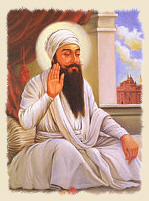
Guru Arjan was married to Ganga, daughter of Krishen Chand, a resident of Meo village near Phillor in Jullundhur district. The marriage took place in 1589 when he was about 26 years old. Guru Ram Das began excavation of two tanks named Santokhsar and Amritsar and started the foundation of the city of Ramdaspur. After his father, Guru Arjan applied himself to the task of completing the tanks and extending the city. It was his practice to go every day and superintend the work.
Masand System
Guru Nanak during his missionary tours had established Sangats at the various places throughout the country. The connection with the center was kept up by the constant visits of the Sikhs to the Guru. During Guru Amar Das's time the missionary work became more regular and methodical. He divided the Sikh spiritual kingdom into twenty-two Manjis. Guru Ram Das established the nucleus of a new order of missionaries called Masands. The word Masand seems to have come from 'Mas Nad' which is shorter form of 'Masnedi-Ali' or His Excellency, the title which the Mughal Governors often held. The purpose of this organization was to spread the Sikh faith at a rapid pace and also to collect money for the construction of tanks and the city of Ramdaspur. Guru Arjan organized Masand system afresh. He appointed new Masands of integrity and sincerity to look after the secular as well as spiritual affairs of the Sikhs. Masands were required to collect Daswandh (one-tenth of income) from the Sikhs which was then contributed towards the Guru's treasury (Golak) for the maintenance of the Sikh temples. Some writers are of the opinion that Daswandh was raised under compulsion. Daswandh was never raised under any pressure nor it was considered 'a tax'. Whatever the Sikhs contributed or are contributing even today, is totally out of free will, love and devotion.
Masands were required to pay annual visits to Amritsar at the Baisakhi fair to receive instructions from the Guru and to hand over the amount of Daswandh collected. Regular accounts of these offerings were kept and receipts were issued. Apart from financial duties, Masands were vigorous preachers. For the ceremony of initiation the ideal Charanamrit was the one administered by the Guru himself. Since it was not possible for the Guru to be present physically everywhere, the authority was delegated to the local missionaries to enrol new members of the Sikh Sangat by administering Charanamrit prepared by themselves in the prescribed manner. It attracted a large number of converts. During the time of Guru Arjan, there was hardly any place in India where the Sikhs were not found. Masands worked very hard to propagate Sikhism in every corner of the country.
Completion of Construction Work
Guru Arjan completed the unfinished work of excavation of tanks- Santokhsar and Amritsar. Bhai Buddha being the most trustworthy disciple, was appointed to supervise the work of construction. Santokhsar was completed in 1587-89. Having completed the tank of nectar, the Guru laid down the foundation of Hari Mandar which is now called Golden Temple, in the center of the tank. It is said that the Sikhs represented to the Guru that Hari Mandar should be the tallest building in the neighborhood. The Guru explained,"Hari Mandar should be the lowest because what is humble, shall be exalted. The more a tree is covered with fruit, the more its branches descend to the earth."
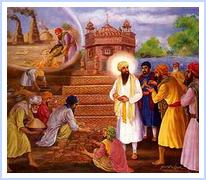
Mian Mir, a famous Muslim saint, was a friend and a devotee of the Guru. The Guru asked Mian Mir to lay the foundation stone of Hari Mandar. Thus, Mian Mir laid the brick in January, 1589. The head mason moved the brick to place it in order. Whereupon the Guru prophesied that since the brick was moved by the mason, the foundation of the temple would be laid again in the coming times. His words were subsequently fulfilled as Ahmad Shah Abdali destroyed the temple and desecrated the tank in 1763. However two years later, the great army of the Khalsa recovered possession of the temple, relaid its foundation and reconstructed it.
Animosity of Prithi Chand
As referred to in the previous chapter, Prithi Chand was superseded and the Guruship was conferred on his youngest brother by his father, Guru Ram Das.
Upon this Prithi Chand adopted an attitude of open defiance. He met Sulhi Khan, a revenue officer of Lahore province and told him that he was filing a complaint to the Emperor against his youngest brother for superseding him. Next he conspired with the headmen of the area who then told Guru Arjan that being the eldest son, Prithia had the right to the property of his father. The Guru gave the property to Prithia and some of it to Mahadev, the other brother, and reserved the voluntary offerings of the Sikhs for himself.
Prithi Chand in alliance with Sulhi Khan found ample opportunities to harass the Guru. However Wazir Khan, Akbar's assistant prime minister, interposed on behalf of the Guru and prevailed on Sulhi Khan to bring the two brothers to a compromise. By listening to Guru's Sukhmani (The song of Eternal peace compiled by Guru Arjan), Wazir Khan was restored to perfect health from dropsy ailment. This was the reason why Wazir Khan supported the Guru's cause. Although the compromise had been affected, yet Prithia continued to create every possible trouble for the Guru. Ultimately the Guru decided to leave Amritsar and make a tour of Majha, an area between the rivers Ravi and Beas.
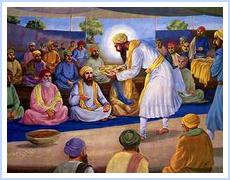 |
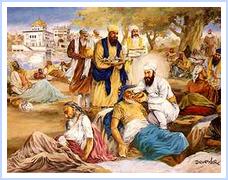 |
Prithia's wife was very much sore and complained,"The eldest son has been superseded. The youngest one obtained the Guruship and the whole world, both Emperor and the common man, worships him." Prithia replied,"Arjan has no son and so his prosperity is short-lived. Our son Meharban will be the next Guru." Guru's wife heard this conversation and reported it to the Guru, and prayed that he should grant her a son. He bade her to pay no heed to the remarks of Prithia or his wife but should continue to repeat true Name. One day again she requested the Guru,"O King, they who seek thy protection, obtain happiness in this life and salvation in the next. My married life would be most happy if you grant me a son."
The Guru always blessed his Sikhs and then most of the religious acts were performed through them. When his wife continued pressing for the gift of a son, he told her to go to his revered Sikh, Bhai Buddha and pray for the desired gift. Next day the Guru's wife set out in great state to see Bhai Buddha. She took her attendants and the wives of the headmen of Amritsar and rode in carriages with great pomp and show. She carried plates of sweets as offering to the saint. When Bhai Buddha saw the procession he remarked,"What happened! Is there a stampede from Amritsar that the inhabitants have left the city and are coming here?" She placed plates of sweets before Bhai Buddha and prayed for his blessing. Bhai Buddha replied,"Respected lady, I am only a servant of your house. It is only the Guru who is an ocean of supernatural power, who fulfills every one's desires. I am also not worthy of these savoury dishes. Were I to eat them, how could I, afterwards, think of cutting the grass?"
So she came back very much disappointed and related the whole story to the Guru, who then remarked,"The saints and the true Guru are not pleased with display of pomp. If you desire anything from them, appear before them not in a state of superiority but in a humble manner. If you still desire the saint's blessing, then with devotion in thy heart, prepare bread with your hands, dress yourself like an ordinary person and go alone on foot."
As instructed by the Guru, she proceeded all alone next day. On seeing her Bhai Buddha said,"Hail O lady! Give me what you have brought." While eating he said,"The Guru is the owner of the storehouse, but I have received instructions to open it. As you have given me food of my heart's content, so shall you have a son of thy heart's content." On her return she told the Guru about the graciousness of Bhai Buddha.
When Prithias learnt the news of Guru's wife's pregnancy, they got very upset and instigated Sulhi Khan against the Guru. To avoid conflict, the Guru moved to village Wadali, about six to seven miles away from Amritsar. On 19th of June, 1595 (21st of the month of Har, Sambat 1652), Guru's wife gave birth to a son named Har Gobind at Wadali.
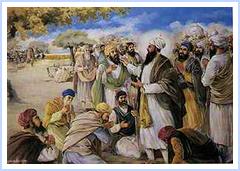 |
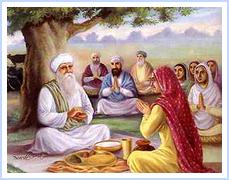 |
On hearing the birth of Har Gobind, Prithias were very much saddened. They immediately began to hatch conspiracies to put an end to the life of the infant Har Gobind.
Several attempts were made to this effect. Prithia hired a nurse to poison the baby. She applied poison to nipples of her breast and went to Wadali. In the meantime the child was said to have stopped breast suckling due to some indisposition. The nurse first congratulated the Guru's wife on the birth of the child. She then caressed and fondled the baby trying to breast feed him. The child refused suckling. At that time, for some mysterious reasons, nurse fainted and fell backwards. When she regained her consciousness, she repented and disclosed that Prithia had hired her to kill the infant. The story of Prithia's ill scheme spread from house to house.
Prithia then hired a snake-charmer and induced him to kill the child by exposing him to a cobra. He promised the snake-charmer a great sum of money if he succeeded in the plot. The snake-charmer found a chance and let a black cobra loose in the court-yard. It is said that Har Gobind took the hissing cobra in his hand and killed it immediately.
Sikhs from distant places visited Amritsar during the absence of the Guru. Prithia made efforts to convince them that he was the real Guru but could not succeed in his mission. When Har Gobind was two years old, some prominent Sikhs came to Wadali and requested the Guru to return to Amritsar which he did. Har Gobind became ill with small-pox of very virulent type. The people suggested to the Guru to make offerings to the goddess of small-pox but he rejected their advice to worship the goddess for the recovery of his son's illness. He, rather, stressed the worship of only one God who is the Creator and the sole Cherisher. The Guru uttered many Sabads in Rag Bilawal and Sorath on this subject. By the grace of God, Har Gobind recovered fully in a few days.
Prithia took another shot and induced Har Gobind's male nurse to poison the child. Next day the servant slipped poison in the baby's milk. The child, however, turned away from the poisoned milk and refused to drink it. The servant tried to fondle Har Gobind in feeding the contaminated milk but in vain. When the baby started crying, the Guru inquired of the cause of his weeping. The servant replied that he did not drink the milk and when he pressed him to drink, he began to cry. Then the Guru, himself tried to feed the baby who insisted on refusing to drink. Upon this the Guru took a sample of that milk and fed it to a dog which fell immediately sick and died. The servant realized his ill doings and confessed to the Guru and disclosed the murderous designs of Prithia.
Prithia became very furious and went to Delhi with Sulhi Khan to complain against the Guru to the Emperor. Before his departure to Delhi, Guru's other brother, Mahadev and Bhai Gurdas tried to restrain Prithia but he would not listen. Sulhi Khan presented the complaint to the Emperor who decided not to interfere in the affairs of religious men and secondly he concluded that the charges were not true. Prithia was crushed by his disappointment.
When Har Gobind became of a suitable age to receive instructions, he was entrusted to Bhai Buddha for his education. Bhai Buddha gave him adequate lessons and also taught him the use of offensive and defensive weapons, riding, chemistry, astronomy, medicine, agriculture, administration and other sciences. The Guru offered acknowledgement to Bhai Buddha for his successful and comprehensive instructions.
Compilation of Adi Granth
Prithia was composing his own religious hymns which he described as compositions of Guru Nanak and his successors. The ignorant people did not have sufficient intelligence to discriminate. Guru Arjan, therefore, felt the need to lay down rules to guide his followers in their daily religious duties. He made plans for the compilation of Adi Granth. For that purpose he chose a secluded spot outside the city which is now called Ramsar. He got a tank excavated there. Tents were erected for the accommodation. Guru Arjan took abode near the tank and dictated hymns to Bhai Gurdas who wrote them down. The verses were arranged according to Rags or musical measures. The hymns of the first Guru came first as Mohalla 1 (read as Mohalla pehla), then those of the second Guru- Mohalla II (read as Mohalla Duja) and so on. After the Bani of the Gurus, came the verses of the Bhagats or the Indian saints. The hymns of the Adi Granth were thus set according to thirty-one Indian Classical Ragas.
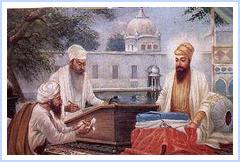
The composition of Adi Granth consisted of the hymns of the first five Gurus, Hindu saints (Brahmans as well as Sudras) and Muslim Sufis. These saints were: Beni, Bhikhan, Dhanna, Farid, Jai Dev, Kabir, Nam Dev, Parmanand, Pipa, Ramanand, Ravidas, Sain, Sadhna, Sur Das and Trilochan. It also contained the hymns of Minstrels (Bhats and Bards). These minstrels were all Brahmans and then became Sikhs of the Guru, they were- Kal, Jalap, Bhika, Sal, Bhal, Nal, Bal, Gyand, Mathura, Kirat and Harbans. It also consisted of Var of Satta and Balwand, Ramkali Sad by Sundar and five Sabads of Mardana, the minstrel of Guru Nanak.
On Bhadon Sudi first, Sambat 1661 (1604 A.D.), Adi Granth was installed in the Hari Mandar and Bhai Buddha was appointed as the first Granthi (priest).
Prithi Chand's jealousy continued
Prithia addressed the Qazis and the Pandits who had enmity towards the Guru on account of his compilation of Adi Granth and he induced them to make a complaint to the Emperor that Guru Arjan had compiled a Granth in which Muslim and Hindu prophets were reviled.
Upon this the Emperor sent for the Guru and the Granth. The Guru did not go himself but sent Bhai Buddha and Bhai Gurdas to read to the Emperor from the Granth. Various stanzas (Sabads) were read to him and Emperor Akbar was very much pleased and said,"Except love and devotion to God, I find neither praise nor blame of any one in the Granth. It is a volume worthy of reverence." Guru's slanderers and enemies were stunned. Akbar gave Siropas (dresse s of honor) to Bhai Buddha and Bhai Gurdas, and promised to visit the Guru on his way back from Lahore.
Martyrdom of Guru Arjan Dev
During the times of Guru Arjan, crowds adopted Sikhism in Punjab and in various other parts of India and even in the neighboring countries. It is said that the hilly Rajas of Kulu, Suket, Haripur and Chamba visited the Guru and became his followers as did the Raja of Mandi. Guru's fame and influence became widely spread.
At that time Chandu Lal was Emperor Akbar's Diwan or financial advisor. He was a Khatri by caste and was originally an inhabitant of Rohela village in Gurdaspur district of Punjab. His official duties necessitated him to reside in Delhi. He had a young daughter of extreme beauty. Her mother, one day, said to her father,"Our daughter is growing to maturity. We should search for a husband for her." Chandu Lal, therefore, sent his family priest and barber in search for a suitable match for his daughter. The priest and the barber searched every city in the Punjab but could not find a satisfactory match. One day again Chandu's wife insisted that they should continue their efforts. So the priest and the barber were again despatched for the purpose. They searched and searched and when they reached Lahore, they heard about the Guru's young son, Har Gobind. They went to Amritsar and found Har Gobind as the most descent match for the young girl. They came back and reported to Chandu accordingly. They gave their analysis on the excellence of Har Gobind and the enormous respect that his father was commanding in the city of Amritsar. Chandu was not pleased hearing praises of the Guru, so he asked the priest and the barber,"Do you think him equal to me? Guru's caste is inferior to me. You desire to put the ornamental tile of top storey into a gutter! Where am I, the imperial finance minister; and where is the Guru, though he may be an object of veneration to his followers?"
After the husband and wife had argued the whole night over the matter, it was decided that Sada Kaur (their daughter) should be given in marriage to Har Gobind. The marriage presents were, therefore, dispatched to Amritsar. It came to the ears of the Sikhs of Delhi that Chandu had used derogatory expressions for the Guru. They sent a messenger with a letter explaining Chandu's utterances and prayed to the Guru to reject his alliance. The Sikhs of Delhi as well as of Amritsar prayed that the alliance of a haughty head like Chandu should not be accepted. The Guru was obliged to accept the advice of his Sikhs and so with utmost humility he told the matchmakers,"I am contented with my humble lot and desire not an alliance with the great. An ornamental tile should not be put in a gutter."
While the matchmakers were still remonstrating, a Sikh, Narain Das, a grandson of Bhai Paro (a famous Sikh of Guru Amar Das) stood in the congregation and beseeched the Guru,"O king, I am the dust of thy lotus feet. I have a daughter whom my wife and I have vowed to offer to thy son. If you make her the slave of thy feet, I shall be fortunate. I am a poor unhonored Sikh and thou art the honor of the unhonored." The uru replied,"If you have love in your heart, then your proposal is acceptable to me." Narain Das at once went and purchased the marriage presents and betrothal ceremony was performed. Upon this another Sikh, Hari Chand stood up and appealed,"O true king, I have vowed to give my daughter to thy son. If my petition please thee, I will give my daughter as a servant to Har Gobind." The Guru though unwilling at first to accept a second wife for his son, felt that he could not reject the offer of a faithful Sikh.
All this happened in the presence of Chandu's matchmakers who went back to Delhi and disappointed their master with sad news. Chandu was very much incensed and he wrote a letter to the Guru apologizing for his thoughtless expressions. He pleaded with the Guru that if he accepted his alliance, he would give large dowry to his daughter and he would have many favors conferred on him (Guru) by the Emperor. In the end he wrote that he was already on bad terms with his brother Prithi Chand and if he fell out with him too, it might ignite a blazing fire which would be difficult to extinguish.
He despatched the letter with the priest. The Guru having read it, stated,"It is the pride that ruins men. Man suffers for his acts. They whom the Creator joineth, are united and they whom men joineth, are not. It is the Guru's rule to comply with the wishes of his Sikhs. Their words are immutable. As for his threats, I have no fear because God is the guardian of all." The priest returned with this message. This set the stage for Chandu's evil designs against the Guru.
The Emperor Akbar died soon after and was succeeded by his son Jahangir. Akbar had nominated his grandson Khusro in supersession of his son. Khusro claimed Punjab and Afghanistan which his father, Jahangir, was unwilling to concede to him. Jahangir ordered Khusro's arrest but the latter escaped and went towards Afghanistan. On his way he visited the Guru at Tarn Taran and told him that he was unfriended, needy, poor and had no travelling expenses. So he begged the Guru for pecuniary assistance.
Khusro had previously visited the Guru accompanying his grandfather Akbar and was, therefore, very well known to him. Secondly in Guru's house everybody- friend or foe, king or pauper, is treated equally. The Guru knew what was coming, but seeing the plight of the prince, he gave Khusro financial help. Khusro was, however, seized while crossing Jehlum, by the imperial forces and was brought in chains to his father.
Prithia continued to retain the assistance and co-operation of Sulhi Khan against the Guru. On the pretext of collecting revenue in the Punjab, Sulhi Khan obtained leave from the Emperor. On his way he visited Prithia at his village Kotha where they concocted plans for the Guru's destruction. In the meantime, however, Prithia took Sulhi Khan to show his brick-kilns, where Sulhi Khan met with his accidental death by his sudden fall in the live brick-kiln.
Prithia was very much saddened at the death of his ally in evil. In those circumstances Chandu came to his rescue and filled the gap. Chandu wrote to Prithia to use his influence to bring his daughter's alliance with Har Gobind. Prithia was ready to assist Chandu in his nefarious designs against the Guru. He wrote back that the Guru who had deprived him of his right over Guruship, was already his enemy; and he would only be too happy to assist in meting him with adequate punishment. In his letter he begged Chandu to use his influence with the Emperor to bring the Guru to justice. So they both concocted a plan to induce the Emperor by some means to visit Punjab where they would have an opportunity to enter into some conspiracy against the Guru.
Chandu's scheme was successful and in a short period of time the Emperor came to Punjab. He told the Emperor that Guru Arjan was acting as his rival in Punjab by entertaining thieves and exercising independent authority. Upon this the Emperor sent an order to the Guru through Sulabi Khan, the nephew of late Sulhi Khan, to abstain from such practices. On his journey to Amritsar, Sulabi Khan confronted with some Pathans and was killed. When Chandu heard the death of Sulabi Khan, he convinced the Emperor that ithad been done through the machinations of the Guru. He added that he had done many such misdeeds. For example the Guru had deprived his elder brother Prithi Chand of his rights over Guruship and had also endeavored to deprive Hindus and Muslims of their religions. The Emperor immediately sent for Prithia who was overjoyed with the invitation. He made preparations to go to the Emperor but after the dinner he got a cramp in his stomach and died the same night.
Meharban, son of Prithia, wasted no time after the death of his father in informing Chandu who in turn informed the Emperor that the Guru had blessed Khusro and had promised that he would become the Emperor. The Emperor was also notified that the Pundits and the Qazis were enraged at the compilation of Adi Granth which blasphemed the worship rules of the Hindus and the prayer and fasting of the Muslims. By such accusations, Chandu induced the Emperor to summon Guru Arjan.
Emperor Jahangir writes in his autobiography:
"In Goindwal, which is on the river Biyah (Beas), there was a Hindu named Arjan, in the garments of sainthood and sanctity so much so, that he had captured many of the simple- hearted of the Hindus and even the ignorant and foolish followers of Islam, by his ways and manners, and they had loudly sounded the drum of his holiness. They called him Guru and from all sides stupid people crowded to worship and manifest complete faith in him. For three or four generations (of spiritual successors) they kept this shop warm. Many times it occurred to me to put a stop to this vain affair or to bring him into the assembly of the people of Islam.
At last, when Khusro passed along this road, this insignificant fellow proposed to wait upon him. Khusro appened to halt at the place where he was, and he came out and did homage to him. Hebehaved to Khusro in certain pecial ways, and made on his forehead a finger-mark of saffron which the Indians call Qashqa and is considered propitious. When this came to my ears and I fully knew his heresies, I ordered that he should be brought into my presence and having handed over his houses, dwelling places, and children to Murtaza Khan (Sheikh Farid Bukhari) and having confiscated his property I ordered that he should be put to death with tortures."
The following events led to the Guru's summons by the Emperor resulting in martyrdom:
To begin with, it was his elder brother, Prithi Chand who devoted his whole life to harm the Guru in every possible way. Secondly Chandu's animosity over his daughter's non-alliance with the Guru's son, is considered the main fuel. These men with jealousies in their hearts, concocted the real story of Khusro to rouse the ire of Emperor Jahangir which added fuel to the blazing fire. Along with these circumstances Guru's increasing influence to convert crowds of Hindus and Muslims, created a stir in the minds of the Pundits (Brahmans) and the Qazis (Muslim priests). The compilation of Adi Granth was considered a serious blow to other religions. Through all these circumstances Guru Arjan fell a victim to the bigotry and inhumanity of the Mohammadan Emperor.
Before his departure to Lahore, the Guru appointed his son, Har Gobind as his successor and gave suitable instructions. He took five Sikhs, Bhai Bidhi Chand, Bhai Langaha, Bhai Piara, Bhai Jetha, and Bhai Pirana, with him. Some writers say that Emperor Jahangir had gone to Kashmir before the arrival of the Guru in Lahore.
The Emperor Jahangir addressed the Guru,"Thou art a saint, a great teacher, and a holy man; You look on all, rich and poor, alike. It was therefore, not proper for you to give money to my enemy Khusro."
The Guru replied,"I regard all people, whether Hindu or Musalman, rich or poor, friend or foe, as equals; and it is on this account that I gave your son some money for his journey, and not because he was in opposition to you. If I had not assisted him in his forlorn condition, and so shown some regard for the kindness of thy father, Emperor Akbar to myself, all men would have despised me for my heartlessness and ingratitude, or they would have said that I was afraid of you. This would have been unworthy of a follower of Guru Nanak."
The Guru's reply did not sooth Jahangir's feelings and he ordered him to pay two lakhs of rupees (two hundred thousand rupees), and also to erase the hymns in his Granth which were opposed to the Hindu and Muslim religions. The Guru replied, "Whatever money I have is for the poor, the friendless and the stranger. If you ask for money, you may take whatever I have; but if you ask for it by way of fine I shall not give you even a penny, because a fine is imposed on the wicked worldly persons and not on priests and saints. As regarding the erasure of hymns in the Adi Granth, I cannot erase or alter an iota. I am a worshipper of the Immortal God. There is no monarch save Him; and what He revealed to the Gurus, from Guru Nanak to Guru Ram Das, and afterwards to myself, is written in the holy Granth.
The hymns contained in the Adi Granth are not disrespectful to any Hindu incarnation or any Mohammadan prophet. It is certainly stated that prophets, priests, and incarnations are the handiwork of the Immortal God, Whose limit none can find. My main object is to spread the truth and the destruction of falsehood; and if, in pursuance to this objective, this perishable body is to depart, I shall account it great good fortune."
The Emperor left and the Guru was placed under the surveillance of Chandu. Some writers say that Guru Arjan's execution was nothing except usual punishment of revenue defaulter. It seems that these writers are totally ignorant of Sikh tradition. When the Sikhs of Lahore came to know about the fine of two lakhs of rupees, they decided to raise the money to discharge the Guru's obligation of fine. The Guru issued a stern warning to his Sikhs that whosoever contributed to pay the fine imposed on him, would not be his Sikh. It was a matter of principle as mentioned in the Guru's reply above, and not a matter of two lakhs of rupees which could have been collected in twinkling of an eye. Fines are for thieves, robbers, slanderers and the wicked. Men devoted to religion did not belong to that category. It is, therefore, baseless to say that Guru's execution was usual punishment of revenue defaulter. The Qazis and Brahmans offered alternatives to the Guru to exchange death for expunging the alleged objectionable passages in Adi Granth and inserting the praises of Mohammad and of the Hindu deities. The Guru did not budge from his position.
Guru Arjan was made to sit on the red hot iron pan and burning sand was poured over his bare body. He was seated in red-hot caldron, and was bathed in boiling water. Guru's body was burning and was full of blisters.
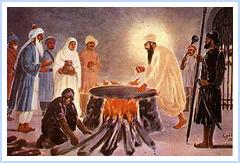 |
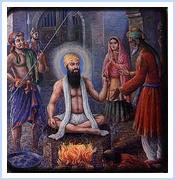 |
His friend and devotee, Mian Mir, a Muslim saint, rushed to see him. When Mian Mir saw the ghastly scene, he cried out and said,"O Master! I cannot bear to see these horrors inflicted on thee. If you permit me, I would demolish this tyrant rule (Mian Mir is said to have possessed supernatural powers at that time)." The Guru smiled and asked Mian Mir to look towards the skies. It is said that Mian Mir saw Angels begging the Guru's permission to destroy the wicked and the proud.
The Guru addressed Mian Mir,"Mian Mir, you are perturbed too soon. This is the Will of my Master (God), and I cheerfully submit and surrender to His Sweet Will." The Guru repeated and exemplified in action the meaning of this verse:
"Tera kia meetha lagei Har Nam padarath Nanak mangei." (Asa Mohalla 5, p-394)
'Sweet be Thy Will, my Lord Nanak beseecheth the gift of Nam.' (Translation of the above)
The Guru bore all this torture with equanimity and never uttered a sigh or a groan.
The Guru was unruffled!
The Guru remained calm and unperturbed like a sea!
The Guru was in Absolute Bliss!
This was the wonder of the Lord- an unparallel example in the history of mankind.
Mian Mir asked, why was he enduring the suffering at the hands of his vile sinners when he possesseth superpowers? The Guru replied,"I bear all this torture to set an example to the Teachers of True Name, that they may not lose patience or rail at God in affliction. The true test of faith is the hour of misery. Without examples to guide them, ordinary persons' minds quail in the midst of suffering." Upon this Mian Mir departed commending the Guru's fortitude and singing his praises.
The Guru was again addressed to comply with the demands of his enemies. When he was threatened with further torture, he replied,"O fools! I shall never fear any torture. This is all according to God's Will, any torture wherefore affordeth my pleasure." He is said to have uttered this Sabad:
" The egg of superstition hath burst; the mind is illumined;
The Guru hath cut the fetters off the feet and freed the captive.
My transmigration is at an end.
The heated caldron hath become cold; the Guru hath given the cooling Name.
Since the holy man hath been with me, Death's myrmidons, who lay in wait for me, have left me.
I have been released from him who restrained me; what shall the judge do to me now?
The load of karma is removed; I am freed therefrom.
From the sea I have reached the shore; the Guru hath done me this favor.
True is my place, true my seat, and truth I have made my special object.
Truth is the capital; truth the stock-in-trade which Nanak hath put into his house."
(Maru Mohalla 5, p-1002)
Chandu thought to suffocate him in a fresh cowhide, in which he was to be sewn up. Instead the Guru asked for a bath in Ravi river which flowed embracing the walls of Lahore city. Chandu revelled at the thought that the Guru's body full of blisters, would undergo greater pain when dipped in cold water and he permitted him to bathe in the river. The soldiers were sent to escort the Guru. The Master's disciples saw him leaving. He looked at them still forbidding any action. He said,"Such is the Will of my God, submit to the Divine Will, move not, stand calm against all woes."
Crowds watched the Master standing in water and having a dip. Lo! The light blended with Light and the body was found nowhere. Hail to the Master! Thou art Wonderful- Martyr, the greatest. Thou art the Greatest!
Salute to mighty king
In Sikhism there is the same emphasis on Raza also called Bhana (God's Will) as there is on renunciation in ascetic cults and creeds. It is a state of mind which understands clearly the Divine Will. The doctrine of Bhana is the acceptance of the Will of God which is the core of Sikh faith. An enlightened mind lives according to inner dictates of His Hukam (order). It is a dedicated submission and infinite patience to accept His Will. Guru Arjan sowed the seed of martyrdom which largely flourished after him and became the heritage of the Sikhs.
To justify and substantiate that prophets and saints can conquer death and suffering, two Sikh Gurus and countless Sikhs have faced martyrdom. They did so to show to the world their belief in the eternity of their spirit and the fearlessness they acquired in the love of God. It is a lesson to the world that true devotion to God transcends the sorrow of life. The Master is not indifferent to the values and to the suffering of the virtuous at the hands of the wicked. To save and defend is His Characteristic (Birdh). He cares for devotion of His devotees and guards His prophets and saints from misery unless He wills and desires that their agonizing experience and painful martyrdom should serve higher purpose.
This was the fourth day of the light half of the month of Jeth, Sambat 1663 (May 30, 1606 A.D.). Guruship was bestowed on Guru Har Gobind.